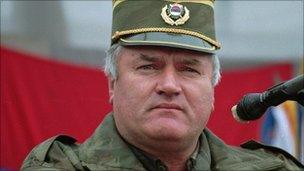Will effect of Ratko Mladic arrest be all good?
- Published
- comments

Mladic faces charges in connection with the massacre at Srebrenica in 1995
The arrest of General Ratko Mladic coming soon after the killing of Osama Bin Laden, underlines that Western democracies will usually catch up with their enemies, even if it takes many years to do so.
That makes it harder for those fighting such countries to retain a sense of impunity.
Among critics of the United States, Nato, or the International Criminal Tribunal, failure to apprehend the likes of Saddam Hussein, Ratko Mladic, or Osama Bin Laden is often held up as an example of the inability of Western countries to prevail in the Middle East or Balkans or the futility of intervention.
When that person is captured, those hostile to the venture often quickly change their tune to, "it won't make any difference".
The evidence suggests it does make a difference - but not always in a good way. The arrest, subsequent trial, and execution of Saddam Hussein, for example, helped clear the way for a more militant, Islamic insurgent leadership in Iraq and increased communal tensions between Shia and Sunni there.
When Abu Musab al-Zarqawi, the Jordanian jihadist who then elbowed his way to the top of the insurgency, was killed by American bombs in 2006, it too made a difference leading to power struggles between would-be successors and increased tensions between the foreign fighters and the Sunni sheikhs who eventually led the "Awakening" movement against them.
In the case of Bin Laden's death, intelligence analysts are cautiously hopeful that the internal arguments produced by his demise will hamper al-Qaeda's operations for years to come.
The more optimistic among them suggest that this may prove more important than attempts by the organisation to avenge the operation on Abbottabad.
Indeed it is a trait of those involved in the hunt for terrorists or war criminals who I have met over the years that they tend to argue that the target organisation is doing all it can to harm Western interests in any case. While subsequent moves might be labelled as revenge, their argument goes, the organisation would have carried them out anyway.
Some argue that there can be other negative consequences of targeting enemy leadership, either with bombs or international court indictments.
If Colonel Muammar Gaddafi, for example, concludes that the recent bombing of his compound or war crimes charges leave him with no choice but to fight to the death, won't many more people perish as a result?
And if those around him feel the same way, doesn't that make the anti-Gaddafi coup, that Britain and France have hoped for since the start of their military action, less likely rather than more?
With the capture of Gen Mladic and the erstwhile Bosnian Serb leader Radovan Karadzic, the lesson likely to the drawn in the Balkans is different.
Unlike al-Qaeda, or the regime in Tripoli, they are not actively fighting at the moment. On the contrary, the willingness of the Serbian government to arrest these men and hand them over for trial in The Hague is evidence of their desire to get closer to the Western family of nations, ideally by joining the European Union.
However it is clear that the latest arrest will send its own message to Gen Mladic's old comrades in the Republika Srpska (the Serb part of Bosnia-Hercegovina). Their assembly has recently been militating for independence, breaking away from the federation created by the Dayton agreement at the end of the bloody Bosnian war.
The arrest of the Serb commander accused of personally supervising the murder of about 7,500 Bosnian Muslim men and boys at Srebrenica may serve to cool heads in the Republika Srpska. It should remind them that those responsible for fresh violence will be held accountable, and of the minimal support they could expect from the Serbian government.
While the question of Balkan fugitive war criminals is now largely closed, there are of course other enemies of the US or Nato who are still at large.
Ayman al-Zawahiri, once Bin Laden's number two, may soon release a new tape taunting the Americans. And Mullah Omar, the Afghan Taliban leader, is still thought to be at large, and arguing against the type of deal that America would like to cut.
Both Zawahiri and Mullah Omar have the consolation of faith. But recent events would suggest that the odds of either man dying a natural death, in freedom, are not good.